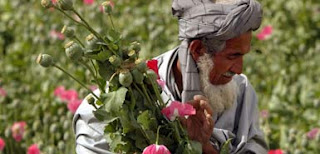 SEE HOW AFGHANS FIGHT US IMPERIALISM FROM YEARS.....
SEE HOW AFGHANS FIGHT US IMPERIALISM FROM YEARS.....WHAT WE HAVE TO STUDY........
KABUL (Agencies): Afghanistan, the world's biggest opium producer, is set for another bumper crop in 2008, providing a windfall for the Taleban who tax farmers to finance their fight against government and foreign forces, the UN said on Wednesday.
More than six years after US-led and Afghan forces toppled the Taleban, the failure to bring spiralling opium production under control means Afghanistan is now locked in a vicious circle Ñ where drug money fuels the Taleban insurgency and official corruption, weakening government control over large parts of the country, which in turn allows more opium to be produced.
The United Nations Office on Drugs and Crime (UNODC) predicted the 2008 opium crop would be similar to, or slightly lower than, last year's record harvest. In 2007, Afghanistan had more land growing drugs than Colombia, Bolivia and Peru combined.
'While it is encouraging that the dramatic increases of the past few years seem to be levelling off, the total amount of opium being harvested remains shockingly high,' said UNODC chief Antonio Maria Costa in a statement.
Opium is processed into heroin, increasingly inside Afghanistan, and smuggled mainly to Europe where users often turn to crime to pay for the highly addictive drug.
'Europe and other major heroin markets should brace themselves for the health and security consequences,' he said.
Opium poppy cultivation has become more concentrated in southern Afghanistan where the Taleban are strongest, while the more peaceful north is increasingly becoming poppy-free.
That trend is likely to increase this year, the UNODC said.
The number of poppy-free provinces is expected to rise from 12 in 2007, to 14 or 15, mostly in the north and east, out of a total of 34 Afghan provinces, the UNODC said.
But opium production continues to grow 'at an alarming rate' in the south and west, it said. All the poppy farmers surveyed in southern Afghanistan said they paid a tax of 10 percent of their opium income to the Taleban or corrupt government officials.
'This is a windfall for anti-government forces,' Costa said. 'Further evidence of the dangerous link between opium and insurgency.'
The report comes as Afghan ministers and international donors are meeting in Japan to discuss developments in Afghanistan.
The world needs to invest more than $2 billion (1.35 billion euros) in irrigation, roads and other rural development in Afghanistan to lure farmers away from booming opium cultivation, a development bank report said Tuesday.
The report, by the World Bank and Britain-based Department for International Development, argued that the drug trade Ñ Afghanistan's top business -- can only be combatted if impoverished farmers have other means of making a living.
'Only as poor Afghan farmers gain other economic opportunities will they be able to be weaned away from dependence on opium production over time,' William Byrd of the World Bank told reporters in Tokyo, where the report was released on the sidelines of an annual international conference on the country's reconstruction.
Cultivation of opium, the raw material for heroin, has taken off in Afghanistan in recent years following the fall of the repressive Taleban regime. Production soared 34 percent in 2007, thanks in large part to increased rainfall.
The report called for the boosting of community-based development projects, expanded irrigation, increased use of livestock, and help for rural businesses and entrepreneurs.

No comments:
Post a Comment